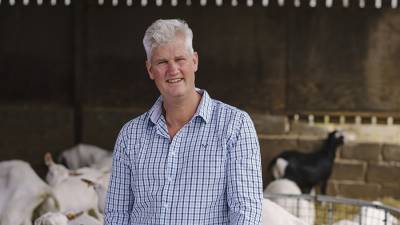
Forde Grange goat farm was first established in 1996 and replaced an existing cow dairy herd. The cow unit was a third herd and part of Childhay Manor Farm owned and managed at the time by my father Tim Frost. Milk Quota had become very expensive to both buy or lease and the alternative of goat milk production looked like a market which had long term potential.
Establishment was most challenging as it was a case of learning from ones mistakes as there was little industry knowledge and advice to help larger scale herds at the time.
The first goal was to study the market. It has now grown into a market with UK production in the region of 37 million litres producing predominantly liquid milk, cheese and butter.
In our case we have a very strong relationship with Delamere Dairies based in Cheshire with milk bottled for them at Shepton Mallet. In the UK producers are regulated by the processors and the processors will not let the producers produce more than what is required for the market. New entrants are only allowed when the processors feel there is a growth in demand.
Herd health is also another crucial factor in establishment of a goat herd. In the early years stock was very hard to come by and our establishment was developed with the help of one or two existing producers who supplied us with kids to get numbers on the ground. The herd has been a closed herd for the last 20 years and has concentrated on herd improvement through the use of breeding our own Bucks using AI onto the best female lines within the herd.
There are huge opportunities from improving genetics within the UK goat industry. Our yields have improved from 850 litres/goat to 1,280 litres/goat in the last 20 years but within the herd there would be goats giving 850 litres/year and goats giving 2,000 litres. We have also within the last 5 years started genomic testing Bucks. We have initially dabbled with Yorkshire Dairy Goats but now have had more success with collaboration with a more robust French breeding programme.
The UK industry has also had the challenge of dealing with unwanted male billy kids. This has seen the development of rearing kids for meat and we sell through Cabrito Meats which, as well ourselves, has been largely invested in by Delamere our milk processor. The marketing of goats meat has been challenging especially with the onset of a pandemic but sales have been increasing and demand is gradually growing. There has also been introduction into NZ of sexed semen which will have potential in the future. AI in goats is growing more popular but still challenging. We feel as a UK industry that laparoscopic AI is quite evasive and we have gone down the route of trying to improve the conventional AI technique. Goats are synchronised and groups are AI’d to allow a specialist to carry out a group service on a visit. Currently success rates are improving with a 50% conception rate achievable.
Forde Grange has stuck with a TMR type feeding system using a Keenan wagon. Nutritional expertise comes from Kelly Farm Consulting who have helped us over the last 20 years. The farm grows 300 acres of Maize with 200 acres fed to the goat herd and 100 acres sold locally. Yields of Maize have vastly improved over the last 20 years largely due to improved soil condition. The land would predominantly contain a large proportion of Clay and would compact easily. All the manure comes in the form of FYM and is heaped throughout the year and spread by contractors in the spring and ploughed under. The soil condition has become more friable, aerated and richer over the years. Goat manure has good P and K levels and spread on dry ground in the spring avoids soil compaction which slurry spreading might do.
Rations also consist of grass silage, sugarbeet nuts, rapemeal, non gm soya, home grown crimped wheat as well as megalac and minerals. The milk is produced to a non gm standard to access an export opportunity into the German non gm cheese market.
The enterprise grew in 2008 to establish a new exciting joint venture with Forde Abbey estate which is ran as a contract farming operation. The herd with the backing of Delamere dairies grew to a herd size of 2,200 goats producing 2.8 m litres. The estate provided land, investment in building infrastructure and operate a no 2 account. Childhay provide stock, management, labour, milking facilities and machinery. Childhay also rear all the goat youngstock on its home farm. Further investment has been made into youngstock rearing facilities so a batch kidding system is operational. The joint venture has given both parties a strong enterprise with any profits shared and also giving scale of production.
The main challenge going forward is the market place. 20 years ago, there would have just been cows milk with goats milk as an alternative health choice on the supermarket shelves. Now of course there are many different types of milk having an impact on market share. This has thrown up opportunities for other markets abroad and at home and Delamere have new potential markets developing worldwide. The improvement in yields and growth in production has to be done hand in hand with the processor to avoid overproduction.
Breeding opportunities are amongst one of our aims. Remaining a high health closed herd is so important and bolstering levels of biosecurity, herd surveillance and accreditation are all objectives going forward to allow marketing of male and female goat lines at home and abroad.